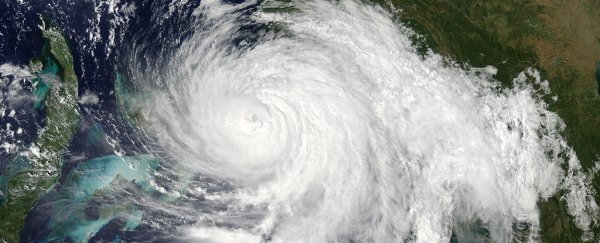When it comes to the weather systems controlling rain and shine across the planet, nothing happens in isolation – everything plays into everything else.
Now, for the first time, scientists have explained how volcanic eruptions can influence the formation of hurricanes.
Investigating this mechanism has been tricky until now, because in the age of sophisticated monitoring equipment, the biggest volcanic eruptions have coincided with El Niño–Southern Oscillation periods, which already trigger more hurricanes.
To solve this lack of real world data, scientists turned instead to detailed computer models to look at how eruption events might affect the formation of hurricanes across the world.
Both hurricane strength and hurricane frequency can be influenced by sudden volcanic activity, the models found.
"This is the first study to explain the mechanism of how large volcanic eruptions influence hurricanes globally," says one of the researchers, Suzana Camargo from Columbia University in New York.
Specifically, large volcanic eruptions in the tropical regions can shift the Intertropical Convergence Zone (ITCZ), a point where northeast and southeast trade winds converge. They're known as the doldrums or 'calms' to sailors.
The ITCZ plays a big part in the frequency and strength of thunderstorms, which is where the link between volcanoes and hurricanes comes in. As the ITCZ shifts, hurricanes (and monsoons) follow behind it.
For example, should a large volcanic eruption happen to go off in the tropical regions of the Northern Hemisphere, that would kick the ITCZ southwards, taking hurricane activity with it.
These effects can still be felt up to four years later, the team of researchers found.
These large-scale eruptions don't change the overall level of global activity from hurricanes and other tropical cyclones, the data showed, they just change where that activity is happening.
However, sea surface temperature changes influenced by volcanic activity where found not to have any effect, based on the models.
As the world gets warmer we need as much insight as we can get into how all of these meteorological events piece together.
Plenty of previous research has looked at how volcanoes can darken the skies, but this latest study is valuable in showing their relationship to other extreme weather events.
Predicting hurricanes remains a notoriously tricky business, with an almost infinite number of contributing factors involved. What we do know is these huge thunderstorms can have a significant impact on the people, animals, and property in their path.
Now scientists have the opportunity to test these data models against information gathered out in the real world in the years to come. The more data we can grab, the better our climate models will be.
"The results of this study lay the groundwork for future research to allow a comprehensive understanding of the tropical cyclone response to volcanic eruptions and advance the projections of near-term climate response to volcanic eruption," conclude the researchers.
The research has been published in PNAS.
